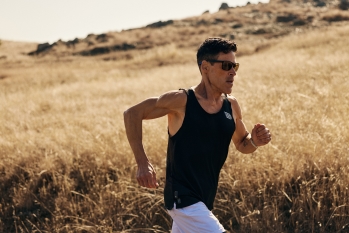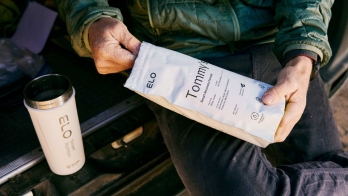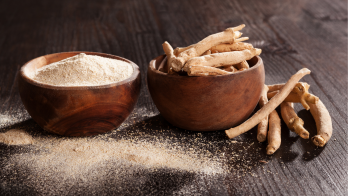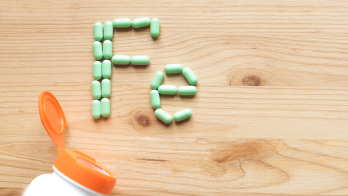The best supplements for cyclists, according to science
If you’re looking to level up your cycling performance, supplementation may help you ride farther, faster, and recover quicker. Here are the best supplements for cyclists that science shows are safe and effective for giving you an extra edge on and off the bike.

To keep up with the intense physical demands of cycling, many athletes turn to supplements. But with so many options out there, it can be difficult to know which supplements are truly safe and effective. From protein powder and creatine to turmeric and beetroot, here are the 11 best supplements for cyclists and the science behind how they can help take your cycling to the next level.
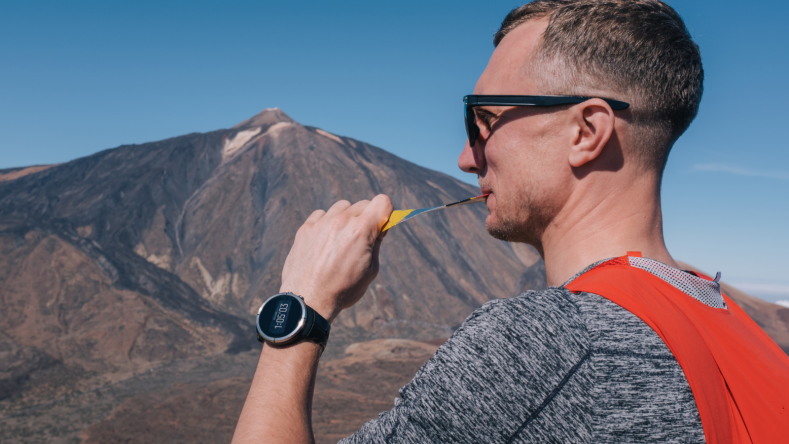
The best supplements for cyclists
Cycling requires strength, endurance, and determination. To perform at your best, it's essential to fuel your body with the right nutrients. While a balanced diet can provide most of the nutrients you need, certain supplements may give you a boost both on and off the bike. Whether you're a pro racer or a casual weekend rider, these supplements can help you reach your cycling goals by improving your overall performance and enhancing your recovery between rides.
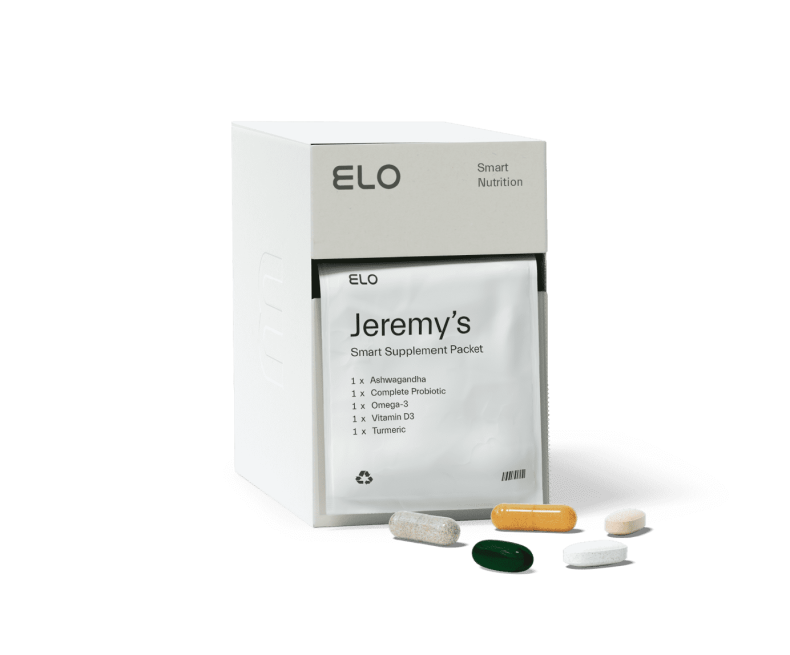
Try supplements made just for you.
If you’re wondering what supplements are best for you, it’s essential to consider your own potential nutrient gaps and subsequent goals for supplementation. At Elo Health, we use a combination of biomarker testing and health coaching to select supplements tailored to your specific nutrition needs, as well as your health and performance goals.
Learn more about how Smart Supplements Smart Protein
Supplements for cycling performance
Many cyclists look to performance-enhancing supplements to help them take their speed, strength, and endurance to the next level. Here are the best supplements for cycling performance, including who they’re suitable for and how you should take them.
Caffeine
Caffeine 1 2
Pre-ride caffeine supplementation at 3 mg/kg of body weight has been shown to improve cycling performance by more than 4% compared to placebo [ 2 3
Sipping on a cup of coffee or caffeinated tea before can give you a boost, but you can also find caffeine in electrolyte drinks, chewing gum, energy bars, and gels which can be more convenient and deliver the perfect amount without adding to an athlete’s pre-race jitters.
If you’re wondering how and when to take caffeine before a ride, experts recommend consuming 3–6 mg/kg of body mass up to 60 minutes before exercise (roughly 200-400 mg for a 68 kg cyclist), though as little as 2 mg/kg can still be effective [ 5 6
Keep in mind that, at high levels, caffeine can have a diuretic effect and cause GI distress. Caffeine tolerance also varies significantly between individuals. For these reasons, experts recommend experimenting with caffeine in training and limiting your total caffeine intake to 400 mg/day or less [ 7
Nitrates (Beetroot)
Packed with nitrates that raise nitric oxide levels in the body, beetroot can improve aerobic exercise performance by increasing blood flow to working muscles and ensuring adequate oxygen uptake by muscle tissues [ 8 9
Nitrate supplementation seems to have the most performance-enhancing effect for exercise lasting 5-30 minutes, so short- to mid-distance cyclists will likely reap the most benefit. Some evidence does show some of beetroot’s benefits may also extend to endurance athletes as well [ 10
Beetroot tends to be dosed on nitrate content [ 11 8
One thing you should know before increasing your beet intake: Consuming beets and beetroot supplements can cause red urine and stool. Though this can be alarming, it is not harmful [ 11
Beta-alanine
Beta-alanine is an amino acid that appears to reduce lactic acid build-up in muscles caused by high-intensity exercise, which can significantly impair performance and worsen fatigue.
By reducing lactic acid buildup, beta-alanine can improve certain aspects of performance (such as anaerobic threshold, time to exhaustion, and muscle fatigue), particularly in cyclists covering short distances at maximum speed and older athletes [ 1
Beta-alanine supplements are available as a powder and in capsule form. For sports performance, experts recommend a daily intake of 4-6 g/day (taken in doses of 2 g or less) for up to 8 weeks, with notable benefits seen after four weeks of supplementation [ 8
One thing to note: Supplementing with beta-alanine may leave you feeling a bit, well, prickly. Tingling fingers and toes, known as paresthesia, typically occurs in the upper body and lasts 60-90 minutes. Though uncomfortable, it is not a harmful reaction and can often be avoided by taking sustained-release beta-alanine supplements or dividing doses throughout the day [ 8
Sodium phosphate
Sodium phosphate is another popular supplement that may benefit both short- and long-distance cyclists.
It is thought to improve oxygen transport and buffer the effect of lactic acid buildup, which can enhance both aerobic and anaerobic capacity, power output, and cardiovascular response [ 8 8
While the impact of gender on sodium phosphate’s benefits isn’t fully understood, some research suggests male athletes may get a bigger performance boost from taking sodium phosphate than females [ 8
Sodium phosphate supplements for sports performance are commonly sold in capsule form.
The recommended sodium phosphate dosage for athletes is 3–5 g/day, split into four smaller doses for 3-6 days [ 8 12
Sodium bicarbonate
Often used in baking and household cleaning, sodium bicarbonate (aka baking soda) might improve athletic performance in short-distance sprint cyclists that feel the muscle burn caused by lactic acid buildup [ 13
Also known as bicarbonate loading, taking baking soda as a supplement can effectively buffer the buildup of lactic acid in muscles during high-intensity exercise [ 8 8
While you can supplement with store-bought baking soda, you may find sodium bicarbonate capsule supplements easier to take.
For performance benefits, sodium bicarbonate can be taken in a single dose of 0.3 g/kg of body weight 60-90 minutes before exercise [ 8
Consuming too much sodium bicarbonate too quickly is a recipe for GI distress, so approach supplementation cautiously until you know how your body will respond, and be sure to experiment with it during training to prevent a race day disaster.
Another thing you should know —baking soda contains a lot of sodium (1,259 mg/teaspoon) and can cause temporary fluid retention. High sodium intake has also been shown to increase your risk for high blood pressure, heart attack, and stroke. The long-term safety of sodium bicarbonate supplementation is unknown, so it’s best if used intermittently [ 1
Best recovery supplements for cyclists
Besides supplements that boost performance, studies indicate that protein powder, tart cherry, creatine, glutamine, omega-3s, and turmeric are among the most effective supplements for post-cycling recovery. Here’s more on how they work and which ones you might want to include in your after-ride regimen.
Protein powder
When it comes to cycling recovery, protein supplementation 15
Experts recommend consuming 20-40 g of high-quality (complete) protein within two hours of exercise, which has been shown to stimulate robust increases in muscle protein synthesis that can benefit both recovery and future performance [ 15
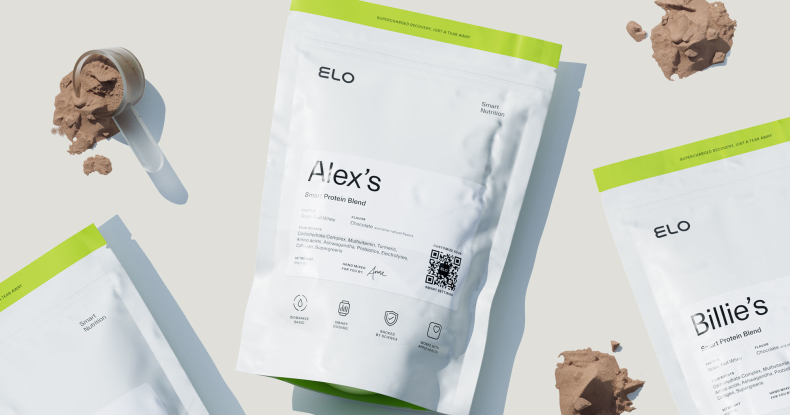
Recover better with Elo Smart Protein
While you can get protein from food sources, high-quality protein supplements for cyclists (like Elo Smart Protein
Elo Smart Protein
Your unique Smart Protein blend is determined using a combination of data from wearables and activity apps, dietary preferences, goals, and blood biomarker results (if available). Your information is then matched with the latest scientific research to determine a blend of ingredients that both maximizes post-workout recovery and supports your health goals. Learn more
Try out Smart Protein today
Tart cherry juice extract
Tart cherries 16 17
Tart cherry supplements can be found in various forms, including juice, capsules, and concentrate. Dosage recommendations vary depending on the preparation; however, most studies have used 8-12 oz (1 oz if in concentrate form) twice a day, 4-5 days leading up to an event, and 2-3 days after to promote recovery [ 17
If you want to experiment with tart cherry juice, look for a product without additives and drink 8-12 oz up to one hour before and after exercising.
Creatine
While creatine
Evidence shows creatine may have recovery benefits for both power and endurance athletes alike, from increasing muscle protein synthesis and enhancing glycogen replenishment to reducing delayed onset muscle soreness (also known as DOMS) [ 18 18
Though it has similar muscle-building benefits to protein, creatine supplementation can cause increased water retention and slight weight gain (1-2 kg), which could hamper cycling performance [ 1
To supplement with creatine, experts recommend starting with a “loading dose” of 20 g/day for 5-7 days, followed by 3-5 g/day after that [ 1 18
Glutamine (L-glutamine)
Glutamine is an amino acid that is both synthesized by the body and consumed in protein-containing foods and supplements [ 1
Research shows that supplementing with glutamine can reduce strength loss and muscle soreness following strenuous exercise while accelerating strength recovery more quickly than a placebo [ 1
Glutamine supplements, also commonly labeled as L-glutamine, are available in powder and capsule form. Dosages ranging from 0.21 - 0.42 g/kg/day are safe and effective for enhancing recovery in athletes [ 1
Omega-3s
Fish oil omega-3s 19
Studies have shown EPA’s and DHA’s anti-inflammatory benefits may reduce soreness and enhance recovery from muscle-damaging exercise [ 18
Studies in healthy adults show that 2 g/day of omega-3s is safe and effective for reducing inflammation while taking 3 g/day can reduce muscle soreness after exercise [ 18 19 19
Turmeric (Curcumin)
Curcumin, the main compound in turmeric
Studies indicate that 150-1,500 mg of turmeric per day may improve post-exercise recovery and reduce muscle soreness. One study found that ingestion before exercise could attenuate acute inflammation, and after exercise, it could reduce muscle damage and facilitate faster recovery [ 20 21 22
Combining turmeric with black pepper, or taking supplements that contain a form of black pepper, can enhance the absorption of curcumin by up to 2,000% and increase its effectiveness [ 20
Other cycling and recovery-related articles you might like
Summary
According to research, certain supplements can enhance the physical performance of serious cyclists during a ride and promote faster recovery after the ride. To improve your performance, you can add caffeine, beetroot, sodium phosphate, beta-alanine, or sodium bicarbonate to their pre-ride routine.
For better recovery, supplements like Elo’s personalized protein powder smart supplements
Disclaimer: The text, images, videos, and other media on this page are provided for informational purposes only and are not intended to treat, diagnose or replace personalized medical care.
Key takeaways
Caffeine, beetroot, and sodium phosphate have been shown to enhance performance in both power and endurance athletes and thus have potential benefits for both sprinters and long-distance cyclists when taken before exercise.
Beta-alanine and sodium bicarbonate may provide additional benefits for short-distance or sprint cyclists due to their ability to buffer lactic acid production.
The best supplements for cycling recovery include protein powder, tart cherry juice extract, creatine, glutamine, omega-3s, and turmeric.
Elo Health
can help you optimize your post-workout nutrition routine withpersonalized protein
,smart supplements
, and 1:1 dietitian support.
References
U.S. Department of Health and Human Services. (n.d.). Office of dietary supplements - dietary supplements for exercise and athletic performance. NIH Office of Dietary Supplements. Retrieved September 20, 2021, from
https://ods.od.nih.gov/factsheets/ExerciseAndAthleticPerformance-HealthProfessional/
Desbrow, B., Biddulph, C., Devlin, B., Grant, G. D., Anoopkumar-Dukie, S., & Leveritt, M. D. (2012). The effects of different doses of caffeine on endurance cycling time trial performance. Journal of sports sciences, 30(2), 115–120.
https://doi.org/10.1080/02640414.2011.632431
Ivy, J. L., Costill, D. L., Fink, W. J., & Lower, R. W. (1979). Influence of caffeine and carbohydrate feedings on endurance performance. Medicine and science in sports, 11(1), 6–11.
https://pubmed.ncbi.nlm.nih.gov/481158/
Warren, G. L., Park, N. D., Maresca, R. D., McKibans, K. I., & Millard-Stafford, M. L. (2010). Effect of caffeine ingestion on muscular strength and endurance: a meta-analysis. Medicine and science in sports and exercise, 42(7), 1375–1387.
https://doi.org/10.1249/MSS.0b013e3181cabbd8
Guest, N. S., VanDusseldorp, T. A., Nelson, M. T., Grgic, J., Schoenfeld, B. J., Jenkins, N. D. M., Arent, S. M., Antonio, J., Stout, J. R., Trexler, E. T., Smith-Ryan, A. E., Goldstein, E. R., Kalman, D. S., & Campbell, B. I. (2021). International society of sports nutrition position stand: caffeine and exercise performance. Journal of the International Society of Sports Nutrition, 18(1), 1.
https://doi.org/10.1186/s12970-020-00383-4
Ganio, M. S., Klau, J. F., Casa, D. J., Armstrong, L. E., & Maresh, C. M. (2009). Effect of Caffeine on Sport-Specific Endurance Performance: A Systematic Review. Journal of Strength and Conditioning Research, 23(1), 315–324.
https://doi.org/10.1519/jsc.0b013e31818b979a
Shearer, J., & Graham, T. E. (2014). Performance effects and metabolic consequences of caffeine and caffeinated energy drink consumption on glucose disposal. Nutrition Reviews, 72, 121–136.
https://doi.org/10.1111/nure.12124
Kerksick, C. M., Wilborn, C. D., Roberts, M. D., Smith-Ryan, A., Kleiner, S. M., Jäger, R., Collins, R., Cooke, M., Davis, J. N., Galvan, E., Greenwood, M., Lowery, L. M., Wildman, R., Antonio, J., & Kreider, R. B. (2018). ISSN exercise & sports nutrition review update: research & recommendations. Journal of the International Society of Sports Nutrition, 15(1), 38.
https://doi.org/10.1186/s12970-018-0242-y
Domínguez, R., Cuenca, E., Maté-Muñoz, J. L., García-Fernández, P., Serra-Paya, N., Estevan, M. C., Herreros, P. V., & Garnacho-Castaño, M. V. (2017). Effects of Beetroot Juice Supplementation on Cardiorespiratory Endurance in Athletes. A Systematic Review. Nutrients, 9(1), 43.
https://doi.org/10.3390/nu9010043
Jones A. M. (2014). Dietary nitrate supplementation and exercise performance. Sports medicine (Auckland, N.Z.), 44 Suppl 1(Suppl 1), S35–S45.
https://doi.org/10.1007/s40279-014-0149-y
Patel, K. (2020, February 24). Nitrate. Examine.Com.
https://examine.com/supplements/nitrate/
Buck, C. L., Wallman, K. E., Dawson, B., & Guelfi, K. J. (2013). Sodium phosphate as an ergogenic aid. Sports medicine (Auckland, N.Z.), 43(6), 425–435.
https://doi.org/10.1007/s40279-013-0042-0
Patel, K. (2020, May 8). Sodium Bicarbonate. Examine.Com.
https://examine.com/supplements/sodium-bicarbonate/
Stark, M., Lukaszuk, J., Prawitz, A., & Salacinski, A. (2012). Protein timing and its effects on muscular hypertrophy and strength in individuals engaged in weight-training. Journal of the International Society of Sports Nutrition, 9(1).
https://doi.org/10.1186/1550-2783-9-54
Kerksick, C. M., Arent, S. M., Schoenfeld, B. J., Stout, J. R., Campbell, B., Wilborn, C. D., Taylor, L., Kalman, D., Smith-Ryan, A. E., Kreider, R. B., Willoughby, D. S., Arciero, P. J., VanDusseldorp, T. A., Ormsbee, M. J., Wildman, R., Greenwood, M., Ziegenfuss, T. N., Aragon, A. A., & Antonio, J. (2008). International Society of Sports Nutrition position stand: Nutrient timing. Journal of the International Society of Sports Nutrition, 5(1).
https://doi.org/10.1186/1550-2783-5-17
Gao, R., & Chilibeck, P. D. (2020). Effect of Tart Cherry Concentrate on Endurance Exercise Performance: A Meta-analysis. Journal of the American College of Nutrition, 39(7), 657–664.
https://doi.org/10.1080/07315724.2020.1713246
Vitale, K., Hüglin, S., & Broad, E. (2017). Tart Cherry Juice in Athletes. Current Sports Medicine Reports, 16(4), 230–239.
https://doi.org/10.1249/jsr.0000000000000385
Rawson, E. S., Miles, M. P., & Larson-Meyer, D. E. (2018). Dietary Supplements for Health, Adaptation, and Recovery in Athletes, International Journal of Sport Nutrition and Exercise Metabolism, 28(2), 188-199. Retrieved Feb 15, 2021, from
https://journals.humankinetics.com/view/journals/ijsnem/28/2/article-p188.xml
Office of Dietary Supplements - Omega-3 Fatty Acids. (n.d.).
https://ods.od.nih.gov/factsheets/Omega3FattyAcids-HealthProfessional/
Yoon, W. Y., Lee, K., & Kim, J. (2020). Curcumin supplementation and delayed onset muscle soreness (DOMS): effects, mechanisms, and practical considerations. Physical activity and nutrition, 24(3), 39–43.
https://doi.org/10.20463/pan.2020.0020
Tanabe, Y., Chino, K., Ohnishi, T., Ozawa, H., Sagayama, H., Maeda, S., & Takahashi, H. (2019). Effects of oral curcumin ingested before or after eccentric exercise on markers of muscle damage and inflammation. Scandinavian journal of medicine & science in sports, 29(4), 524–534.
https://doi.org/10.1111/sms.13373
Fernández-Lázaro, D., Mielgo-Ayuso, J., Seco Calvo, J., Córdova Martínez, A., Caballero García, A., & Fernandez-Lazaro, C. I. (2020). Modulation of Exercise-Induced Muscle Damage, Inflammation, and Oxidative Markers by Curcumin Supplementation in a Physically Active Population: A Systematic Review. Nutrients, 12(2), 501.
https://doi.org/10.3390/nu12020501

